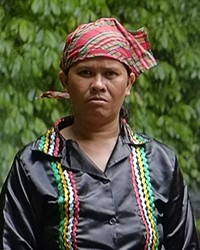Subanen, Tuboy in Philippines

Photo Source:
Theglennpalacio - Wikimedia
Creative Commons
|
Send Joshua Project a map of this people group.
|
| People Name: | Subanen, Tuboy |
| Country: | Philippines |
| 10/40 Window: | No |
| Population: | 108,000 |
| World Population: | 108,000 |
| Primary Language: | Subanen, Northern |
| Primary Religion: | Ethnic Religions |
| Christian Adherents: | 2.00 % |
| Evangelicals: | 0.20 % |
| Scripture: | New Testament |
| Ministry Resources: | Yes |
| Jesus Film: | Yes |
| Audio Recordings: | No |
| People Cluster: | Filipino, Tribal |
| Affinity Bloc: | Malay Peoples |
| Progress Level: |
|
Introduction / History
The Tuboy Subanen live on the island of Mindanao, the second largest island of the Philippines. They generally live in scattered farm settlements in the forested, mountainous interior of the Zamboanga Peninsula on the western side of Mindanao Island. The Tuboy Subanen are a small branch of the Subanen ethnic group and speak various Subanen dialects. Subanen means “those who live along riverbanks and coastal areas.” However, they have been driven to less productive lands. The Tuboy Subanen speak Northern Subanen.
The history of the Subanen is obscure until the 1600s, when they are mentioned in the writings of Spanish Jesuit missionaries. Prior to the twentieth century, their only contact with the outside world was with Arab Muslim merchants who lived along the coast of the peninsula. The Muslims controlled coastal trade and demanded tribute from the Tuboy Subanen. This set the pattern for Subanen relations to this day.
Later the Spanish took over the Philippines. Their control of Mindanao Island was not as powerful as it was in the northern islands, but they tried to “protect” and control the Tuboy Subanen.
What Are Their Lives Like?
Subanen communities are dealing with deforestation challenges because of outside logging companies. They are also at the mercy of mining companies that also encroach on their land. The Tuboy Subanen have initiated tree-planting efforts to restore their valuable land.
Rice is by far their most important crop, although they also raise various other grains such as corn. If there is any extra rice, they sell it at a lowland market for cash, which they need to purchase clothing, utensils and tools. They sometimes trade with neighboring peoples from other parts of Mindanao. In some places they grow coconuts, sweet potatoes, yams, cassava, hemp, squash, eggplant, melons and vegetables. The Subanen also raise various types of livestock including pigs, chickens, cattle and water buffaloes.
Subanen houses usually have some distance between them. Their homes are typically rectangular, raised on stilts, and have thatched roofs. They are generally situated on hillsides or ridges that overlook the family fields.
Unlike most of the world's peoples, the Tuboy Subanen have virtually no division of labor based on sex. Men and women work in the fields together, and men cook and care for the children when necessary. They have little social stratification. Everyone is on an equal level in Subanen society because everyone has the same occupation and has almost the same economic level and lifestyle.
The Subanen permit polygamy (multiple wives), but nearly all marriages involve only one man and one woman. Families usually arrange marriages, and the groom's family is expected to pay a bride price. Occasionally the groom will work for the bride's family for a few years rather than paying a full bride price.
They have their own folklore. Many of them are about tricksters who fool their superiors. For musical instruments they have lutes, drums, gongs, bamboo zithers and a variety of bamboo flutes. Some of their dances involve religious rituals where the dancer goes into a trance.
What Are Their Beliefs?
Since World War II, Christian and Muslim ethnic groups of the Philippines have often clashed. The Subanen, who are polytheists (believe in many gods), have been caught in the crossfire, victimized by one side then the other.
Perhaps for this reason the Tuboy Subanen cling to their ancient polytheistic religion. They believe that man shares the universe with a variety of gods, spirits, demons and ghosts. These supernatural forces are said to have the ability to harm humans. However, humans supposedly have the power to harm them as well. At various times of the year, the Subanen give offerings of rice, meat and wine to the gods and ancestral spirits. Witch doctors, or shamans, play a large role in Subanen religion. The people depend on the shamans to hear and understand the wishes of the gods and ancestral spirits.
They also believe in a supreme god of creation called Gulay.
What Are Their Needs?
The Tuboy Subanen have long been exploited and victimized by their neighbors, binding them to a history of servitude and poverty. Fortunately, they are improving their literacy rates, realizing that will help them in the future.
Prayer Points
Pray for the Tuboy Subanen people to listen to available Christian radio programs and take them to heart.
Pray for Tuboy Subanen leaders to have dreams of the holy and soon-coming Christ.
Pray for Tuboy Subanen people to have enough spiritual hunger to seek and embrace Christ no matter what the cost.
Pray for Tuboy Subanen disciples who will make more disciples.